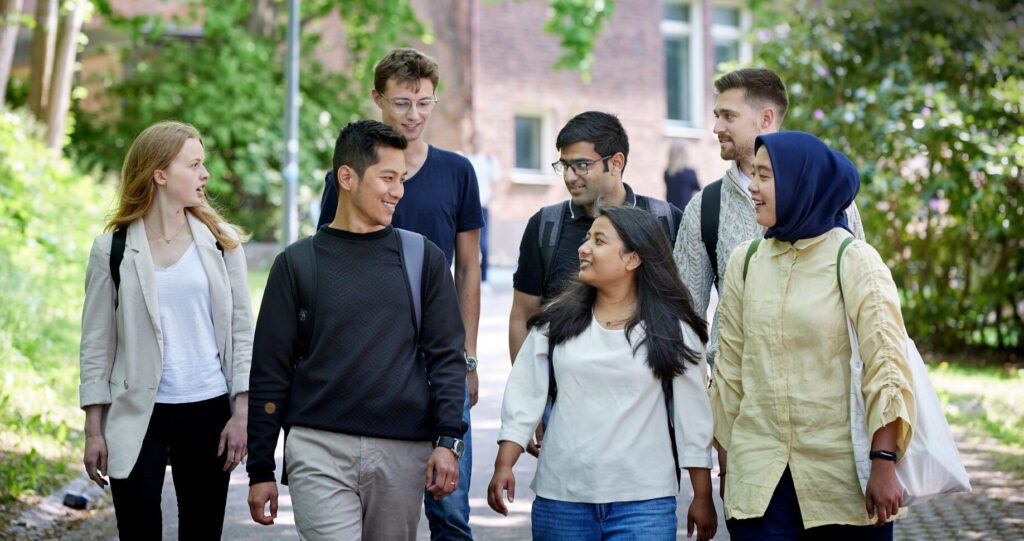After completing her bachelor’s degree in aerospace engineering in Turkey, Halime Selimoglu began searching for a master’s programme in Europe that could bridge her many interests. At first, she sought aerospace-specific programmes. But as she refined her career goals, she realised she was just as drawn to the automotive industry. Torn between staying in the aerospace world and exploring new paths — like road aerodynamics or the marine sector — she found out she didn’t need to choose either or. The MSc Mobility Engineering at Chalmers University of Technology would let her do both.
“When I was introduced to Chalmers’s Mobility Engineering programme, I felt this could be the flexible and comprehensive master’s I was looking for,” she says. “It includes aerospace but allows students to take courses from other tracks like marine, railway, and automotive. The inclusion of the automotive track, in particular, gave me a sense of security, as Gothenburg is a key centre for this industry with both leading and supporting companies.”
Located in Sweden’s second largest city on its scenic west coast, Chalmers is known for its research-intensive environment and consistently ranking among the country’s top universities. “When I was doing general research about Chalmers, I learned that it’s top-ranked in Sweden for employability, which was a major factor in my decision,” Halime says.
Close industry ties, through partnerships with Volvo, SKF, Ericsson and AstraZeneca, add a practical dimension to its academic programmes. These connections ensure that students like Halime gain not only theoretical knowledge but also real-world experience.
It’s an education that opens doors. Today, Halime works as a simulation engineer at Volvo Group — proof of how the programme translates into tangible career outcomes.

Thanks to her education at Chalmers University of Technology, Halime is now able to perform successfully in her career within the automotive industry. Source: Halime Selimoglu
Training engineers for the future of transport
Modern transportation plays a big role in both global economies and everyday life. As industries aim to reduce their environmental impact and increase efficiency, there’s a growing demand for engineers who can develop smarter, safer, and more sustainable systems across various modes of transport.
At the same time, it encourages them to think beyond their specialisation. “In the first semester, we had courses where all the tracks were studied, and they are compulsory to take. That gave me a basic understanding of other industries,” Halime says.
The programme balances depth with breadth. Students choose one of four profiles — aerospace, automotive, marine, or railway engineering — for in-depth study. However, the core courses are shared across all tracks, allowing students to develop a holistic understanding of mobility solutions. These are technical lessons that explore topics through societal, economic, and ethical lenses too.
Course formats vary widely, blending lectures with hands-on assignments, simulations, lab work, and real-life case studies. For instance, after completing the Aircraft Design course, Halime and her classmates visited Heart Aerospace, a Gothenburg-based startup working on electric aircraft. That visit inspired her to pursue her master’s thesis in collaboration with the company.
“Not surprisingly, I applied to write my master’s thesis with Heart,” she says. “I worked on designing the ice protection system for the electric propulsion air intakes.”

Close industry and societal ties shape education and research at the Chalmers University of Technology, offering strong career opportunities for students. Source: Chalmers University of Technology
The Chalmers advantage
Collaboration with industry is a defining feature of the programme. “In every course, we have guest lectures from industry experts — not just from Volvo but also from companies in Germany, England, even F1 teams,” current student Abukar Hassan says. “While being a Chalmers student doesn’t automatically mean you’ll work at Porsche, the opportunity is there if you have the resilience to pursue it.”
The curriculum includes project-based courses where students build skills in teamwork, communication, and project management as they solve real industry problems. When it is time to write a master’s thesis, most students do so with a company.
“It has been surprising to learn that almost all the students at Chalmers write their theses with a company in collaboration,” Halime says. “Almost half of them started at the same company they wrote their thesis with, as I’ve witnessed from my friends’ experience. This thesis collaboration provides a good safety net.”
Thanks to these experiences, graduates are well-prepared to enter high-impact roles. They work in areas such as R&D, system design, and simulation within the automotive, aerospace, marine, and railway sectors. Many are employed by companies like Volvo Group, Volvo Cars, GKN Aerospace, and Trafikverket. Others pursue academic careers or PhD studies in mobility-related fields, either at Chalmers or at universities abroad.
For Abukar, who plans to build his engineering firm one day, the journey is just beginning. “The transport sector faces urgent and exciting challenges,” he says. “Through my studies at Chalmers, I’m building the skills necessary to contribute meaningfully locally and globally.”
Learn more about the MSc Mobility Engineering at Chalmers University of Technology.
Follow Chalmers University of Technology on its Instagram official account and Instagram student account, LinkedIn, TikTok (in Swedish) as well as YouTube official account and YouTube student account.

